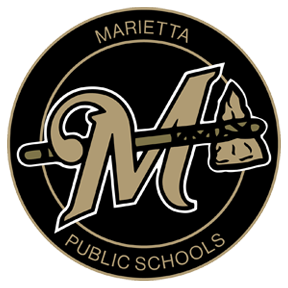As the number of STEM, or Science, Technology, Engineering and Mathematics, jobs continues to rise, creating the need for a better-trained workforce, Marietta Middle School’s Chris Dobbins continues to move forward with the school’s STEM program with the pointing students in that direction.
During the summer, the district broke ground on a new facility that will be equipped with STEM classrooms/labs. Additionally, Dobbins applied for and received several grants, including Project Lead the Way, Career Tech, andVerizon grants.
Even though the facility isn’t completed, Dobbins hasn’t let that stop him from implementing new curriculum.
“Ours is a three-year program,” said Dobbins. “This year we’re doing Design and Modeling in the fall and Computer Science in the spring. Next year, we will be adding a STEM II class with Automation and Robotics in the first semester and Flight and Space in the second semester. And in the program’s third year, STEM will be required for all seventh graders.”
For each new course of study that Dobbins teaches, he must receive training.
“After the third year, I’d like to filter into the high school and offer STEM to freshmen and sophomore classes,” Dobbins continued. “There is a gap there between the middle school and the junior year when students are eligible to participate in vo-tech STEM classes that are also designed around the Project Lead the Way curriculum.”
The grants have allowed Dobbins to add several new elements to the STEM courses.
The addition of drones, a Google SketchUp 3-D Design Software, new tablets and 3-D printers, to name just a few, will allow Dobbins to teach kids to do computer coding, design, and phone apps, among many others.
He’s planning projects that will require kids to design working security systems, toys for children with disabilities, create video projects, even some basic architecture. And he’s adding more all the time.
Dobbins seeks to challenge students, to make them think.
“They spend a lot of time frustrated,” he said, “but they learn a lot.”
The Project Lead the Way curriculum focuses on a series of what they call “transportable skills.”
“We’re teaching kids communication, problem solving and critical thinking, ethical reasoning and mindset, and collaboration,” said Dobbins, “and those are real-world skills that everybody needs, regardless of where they go or what kind of job they end up doing.”

